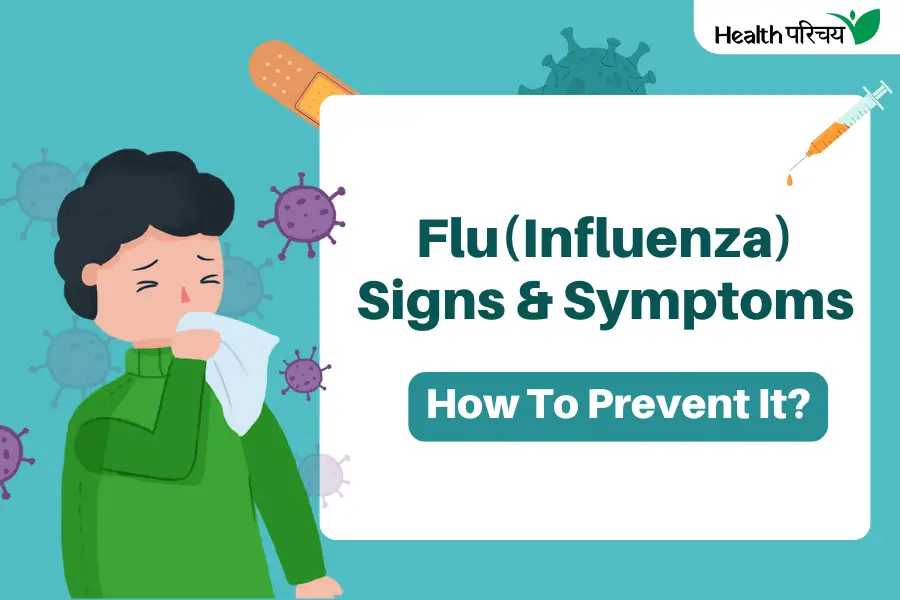Flu Symptoms: Influenza, commonly known as the flu, is a contagious respiratory illness caused by influenza viruses. While many people recover within a few days to weeks, flu can lead to severe complications in certain cases. Understanding its signs, symptoms, and potential complications can help you take timely action to protect yourself and others.
What is the Flu (Influenza)?
The flu is an infectious respiratory disease that spreads primarily through respiratory droplets when an infected person coughs, sneezes, or talks. It can also spread by touching contaminated surfaces and then touching your face. The flu can affect people of all ages, but children, older adults, and those with weakened immune systems are at a higher risk of severe illness.
Common Signs and Symptoms of the Flu
The flu often begins suddenly, with symptoms that can range from mild to severe. Here’s what to watch for:
- Fever and Chills
- A high fever (usually above 100°F or 37.8°C) is one of the hallmark symptoms of the flu. It is often accompanied by chills and sweating.
- Cough
- A dry, persistent cough is common and may worsen over time, causing discomfort and fatigue.
- Sore Throat
- Many individuals experience a scratchy or painful throat, making swallowing difficult.
- Runny or Stuffy Nose
- Nasal congestion and a runny nose are frequent, although these are more common in children.
- Muscle and Body Aches
- Muscle pain and general body aches, especially in the back, arms, and legs, can leave you feeling drained.
- Fatigue
- A sense of extreme tiredness and lack of energy can linger even after other symptoms improve.
- Headache
- Headaches are another common symptom, often accompanied by sensitivity to light.
- Gastrointestinal Issues
- While rare in adults, some people (especially children) may experience nausea, vomiting, or diarrhea.
When to Seek Medical Attention
While most cases of the flu resolve on their own, certain warning signs require immediate medical care:
- Difficulty breathing or shortness of breath
- Persistent chest pain or pressure
- Severe weakness or confusion
- High fever that doesn’t subside
- Bluish lips or face
Complications of the Flu
The flu can lead to several complications, especially in vulnerable individuals. Here are some of the most common and serious complications:
- Pneumonia
- A bacterial or viral lung infection that can be life-threatening, especially for older adults and those with chronic illnesses.
- Sinus and Ear Infections
- Secondary bacterial infections, such as sinusitis or otitis media, are common in children and some adults.
- Worsening of Chronic Conditions
- The flu can exacerbate pre-existing conditions like asthma, diabetes, or heart disease.
- Sepsis
- A severe body-wide response to infection that can lead to organ failure.
- Heart and Brain Complications
- Influenza can sometimes cause inflammation of the heart (myocarditis) or brain (encephalitis).
- Respiratory Failure
- In severe cases, the flu can lead to acute respiratory distress syndrome (ARDS), requiring hospitalization.
Also Read: Yoga Benefits: Keep Your Respiratory System Healthy
Who is at Risk for Flu Complications?
Certain groups of people are more prone to flu complications:
- Young children: Particularly those under 5 years old.
- Older adults: Especially those aged 65 and above.
- Pregnant women: Hormonal and immune system changes increase their risk.
- People with chronic health conditions: Such as asthma, diabetes, or heart disease.
- Immunocompromised individuals: Those undergoing chemotherapy or living with conditions like HIV/AIDS.
How to Prevent the Flu
Prevention is always better than cure. Here are some effective ways to protect yourself:
- Get Vaccinated: The flu vaccine is your best defense and is updated annually to match circulating strains.
- Practice Good Hygiene: Wash your hands frequently with soap and water. Use hand sanitizer when soap isn’t available.
- Avoid Close Contact: Maintain distance from people who are sick, and stay home if you feel unwell.
- Boost Your Immunity: Eat a healthy diet, exercise regularly, and get adequate sleep to keep your immune system strong.
- Disinfect Surfaces: Regularly clean and disinfect frequently-touched objects and surfaces.
Treatment Options for the Flu
While antiviral medications can reduce the severity and duration of the flu, most cases can be managed at home:
- Rest: Allow your body to recover by getting plenty of sleep.
- Stay Hydrated: Drink water, herbal teas, or clear broths to prevent dehydration.
- Over-the-Counter Medications: Use pain relievers like ibuprofen or acetaminophen to manage fever and body aches.
The flu is more than just a seasonal annoyance; it can lead to serious health complications if not managed properly. Recognizing the signs and symptoms early and taking preventive measures can make a significant difference in protecting yourself and your loved ones.







Leave a Reply